,Attachment injuries are emotional wounds activated when you fall in love.
When you’re involved in a push-pull dynamic or you feel as though your partner withdraws, you think life without them is terrifying. Similarly, if you feel an overwhelming urge to be alone that can point to an attachment injury. Likewise, if you are terrified of letting your guard down while you get close to someone, you may be insecurely attached.
Often, you misinterpret the intense feelings that accompany attachment injuries. Namely you believe the emotional rollercoaster is a sign of true love.
You can become addicted to the ups and downs of attachment injuries. In reality, when you believe that the person you’re involved with, in this tumultuous union is your soul mate, you stay stuck. Unaware of what’s really going on, you are jerked around by an attachment injury. As a result you miss out on real love.
What Are Attachment Injuries?
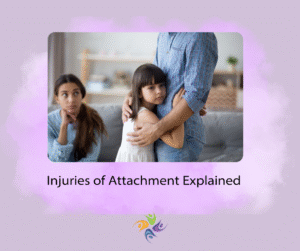 At this point, you understand that our formative years are critical to our development. These years shape who you are. Or at least these years shape who you believe you are, and inform how you understand the world.
At this point, you understand that our formative years are critical to our development. These years shape who you are. Or at least these years shape who you believe you are, and inform how you understand the world.
If you grew up in a chaotic, unpredictable environment you may be a prime candidate for an attachment injury. For example, if you had inconsistent primary caregivers, they may also have been emotionally unavailable. At the same time, they might have been excessively critical. Perhaps dismissive, even cruel and abusive and you were injured.
Children take in a lot of information. Yet they lack the maturity or “worldliness” that’s required to understand and process much of what they experience.
Similarily, if you grew up in an abusive or neglectful household, you only know that environment. Without a big picture perspective, you misinterpret the abuse as normal or think somehow that it is your fault. More often than not you develop destructive coping skills that are rooted in survival. These patterns activate during relationships later in life.
Dismissive Avoidant Attachment
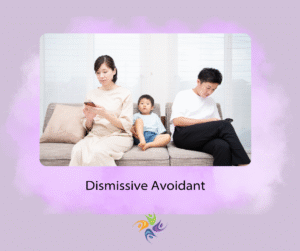
In short, with this type of attachment, you disconnect from your emotions, and tend to withdraw. Your partner’s needs and emotions overwhelm you.
If you identify with this attachment style, you probably had caregivers who were emotionally unavailable. When your emotional needs are neglected, you feel dismissed.
When you expressed your needs and it led to some form of punishment or pain, you developed coping skills to handle this. This taught you to be self-reliant and to suppress your emotions.
Anxious Attachment
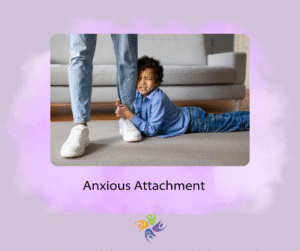
And then, you are always hypervigilant for anything that spells even the smallest threat to the union. If you are anxiously attached, you may constantly need reassurance. And you are aware of and scan your partner’s mood.
During conflict, you want to connect with your partner so badly that you bulldoze boundaries which then overwhelms your partner.
Disorganized Attachment
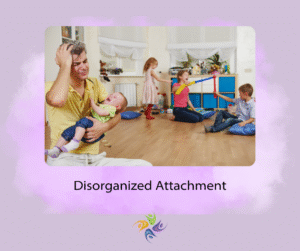
You may suffer from this attachment style if you oscillate between both anxious and avoidant behavior.
If you have this attachment style, you often have trouble regulating your emotions. In fact, this makes your relationship feel turbulent and volatile.
What is Secure Attachment?
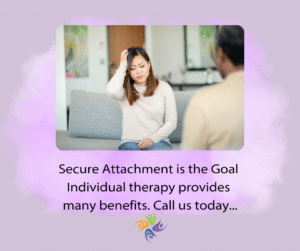
Your goal is to cultivate a healthy attachment. Once you heal your wounds of the past, it’s much easier to not become triggered and revert to old dysfunctional behavior.
If you are securely attached you get your needs met in a healthy way. You form loving meaningful relationships built on communication and trust.
Without all the drama that often accompanies insecure attachment styles, when securely attached in relationship, you are able to enjoy life together. When problems do arise, you are able to resolve them without becoming overly triggered and activated.
Nobody has the perfect childhood, and some are given confusing messages about what love is or what constitutes a healthy relationship.
Therapy is the best way to heal old injuries, including insecure attachment styles. Therefore it breaks the addictive cycle so you can connect in a healthy meaningful way.
We firmly believe the foundation to any relationship begins with your relationship to yourself. When you resolve the wounds of the past in therapy you start on the path of happily ever after, and we can help. The Relationship Therapy Center has two northern California locations—we offer individual and couples therapy in Roseville and Fair Oaks. Call or text any time to learn more.
Feel free to call or text anytime. We’d love to hear from you and share more about how we can help.
Nancy Ryan, LMFT and Certified Gottman Therapist has over 13 years of experience helping people with their relationships. As CEO of RTC, she mentors the clinicians at the center to be highly skilled therapists. Therapist who can help you with your attachment injuries in the Sacramento area in Roseville, CA and Fair Oaks, CA. We also serve clients online in California and Washington.
Begin Individual Therapy in the Sacramento Area
Individual therapy provides many benefits for both your mental, emotional, and physical well-being. From handling challenging life events to learning to live with ongoing mental health issues to simply getting help with everyday stress, seeking counseling can help you live your best life.
If you are ready to start individual therapy, we have a variety of exceptional therapists ready to help you. Take a look at their bios and if you would like to schedule a free 15-minute consultation give us a call.
Other Services Offered at The Relationship Therapy Center in California:
In addition to Individual therapy for adults our Sacramento area counseling clinics located in Roseville and Fair Oaks, CA are pleased to offer a variety of mental health services. Our couples services include: Counseling after infidelity, sex therapy, co-parent counseling, family therapy, divorce counseling, intensive couples retreats, and premarital counseling. Our individual therapy services include, therapy for children, teen therapy, depression treatment, and individual relationship counseling. Our therapists offer online counseling in California to treat a variety of mental health concerns. Please reach out to our Sacramento area therapy office to learn more about the many ways we can help you or your loved ones heal and grow.
- Can a Marriage Counselor Save a Marriage? - February 26, 2026
- Is Our Communication Bad Enough for Therapy? - February 19, 2026
- What are Examples of Trauma? - February 12, 2026
